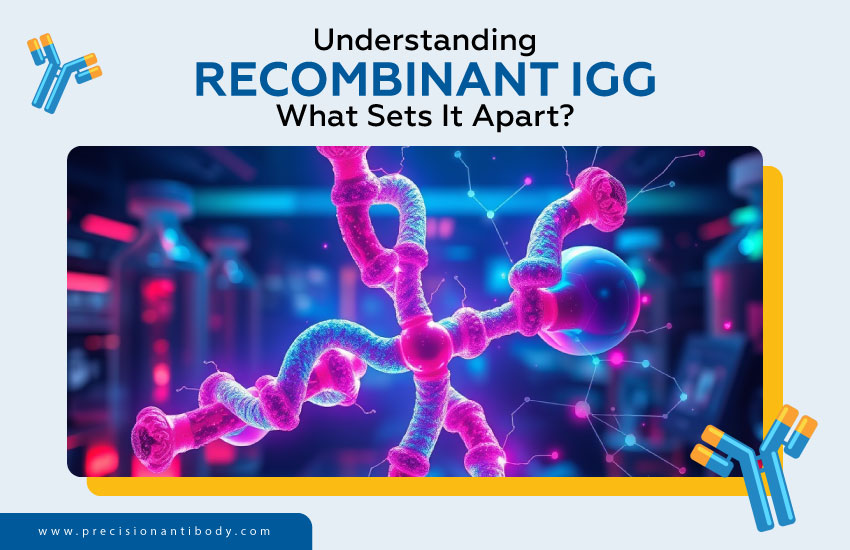
Recombinant immunoglobulin G (IgG) antibodies are much better than monoclonal antibodies, which are usually made using the hybridoma method. DNA sequencing offers unambiguous identification and digital preservation, guaranteeing consistent expression and reproducibility.
This accuracy makes it possible to produce antibodies with precise specificity and affinity, increasing their usefulness for medicinal and research purposes. Recombinant antibodies can also be changed to have helpful properties like better binding to immune receptors, which can improve their treatment.
In addition to customization, recombinant antibodies have ethical and practical benefits. Their manufacture avoids animal immunization solving ethical difficulties with traditional antibody generation. Moreover, recombinant antibodies can target antigens that conventional antibodies cannot, broadening therapeutic opportunities.
Producing these antibodies as fragments or fusion proteins expands their diagnostic and therapeutic uses. This blog covers many reasons recombinant IgG gained popularity and is referred to as the gold standard for producing therapeutic antibodies.
Recombinant Immunoglobulin G (IgG) antibodies achieve superior purity through several key factors:
Recombinant IgG antibodies are extremely valuable in therapeutic and diagnostic applications due to their greater purity, resulting from several features.
To further understand the superiority of recombinant IgG, let’s compare it with other antibody production methods:
| Feature | Recombinant IgG | Polyclonal IgG | Hybridoma IgG |
Specificity | High | Variable | Moderate |
| Consistency | High | Low | Moderate |
| Scalability | Excellent | Limited | Moderate |
Risk of Contaminants | Low | High | Moderate |
Table: Comparison of Recombinant IgG, Polyclonal IgG, and Hybridoma IgG
For therapeutic purposes, recombinant IgG is recommended because it works better than other methods in terms of purity, repeatability, therapeutic potential, and lower risk of immunogenicity. This is because it is a safer and more reliable option for clinical use.
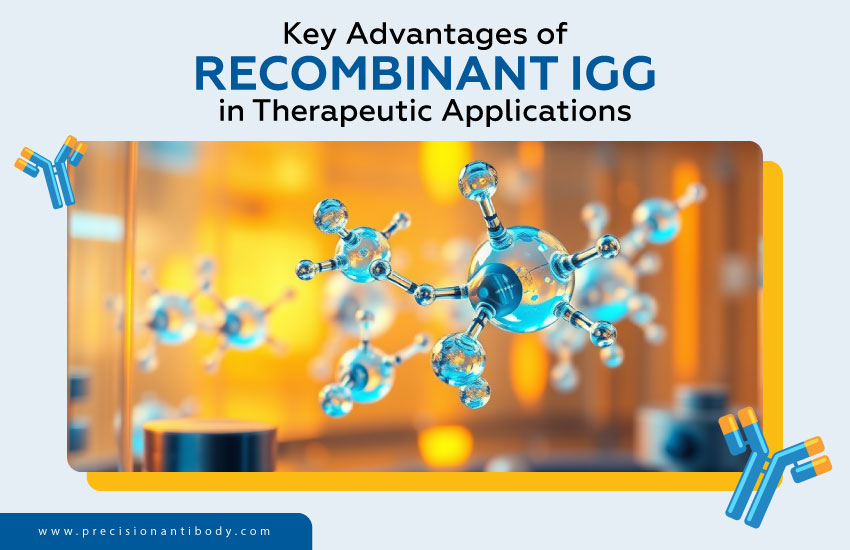
Recombinant Immunoglobulin G (IgG) antibodies offer several key advantages in therapeutic applications:
Because they offer unmatched benefits in purity and batch consistency, recombinant immunoglobulin G (IgG) antibodies have changed how medicines are used. Traditional monoclonal antibodies are made using hybridoma technology, but recombinant antibodies are made using carefully controlled in vitro procedures that guarantee high purity.
This method eliminates the unpredictability of using animals to make antibodies and produces reliable batches with few impurities. This consistency is essential for medicinal applications because it guarantees consistent safety and efficacy profiles across various production lots.
It is also possible to make a lot of recombinant antibodies without lowering their quality because the specific genetic information can be sequenced and kept safe.
Scalability and rapid production are two other significant benefits of recombinant IgG antibodies. Because they are made in a lab, they can be efficiently scaled up to meet higher demand without the problems of traditional hybridoma methods.
This flexibility is invaluable when rapid development and deployment of therapeutic antibodies are required, like during emerging infectious disease outbreaks. Recombinant technology also makes it easier to change antibodies properties to improve their binding or job performance, which increases their therapeutic potential.
It is less likely that recombinant antibodies will get contaminated and less likely to cause an immune response because they are made in a controlled environment. Using recombinant antibodies gets rid of the need to immunize animals.
This lowers the risk of contamination and the chance of immunogenic reactions, which makes patients safer. This reduction in immunogenicity is essential in therapeutic contexts because it reduces the risk of patients experiencing unfavorable immunological responses.
Another revolutionary benefit of recombinant IgG technology is the ability to create customized antibodies for precision medicine. Changing the genes of antibodies so that they target specific antigens very specifically and strongly makes personalized treatment methods possible.
This personalization makes it possible to create therapies specific to the molecular characteristics of each patient’s illness, increasing therapeutic effectiveness and reducing side effects. Also, the number of potential therapeutic targets can be increased by designing recombinant antibodies that target antigens that are hard for regular antibodies to target.
It’s clear that recombinant antibody technology has the potential to change modern therapeutics completely. One example is the vast benefits that recombinant IgG antibodies offer in therapeutic applications. These include high purity and batch consistency, scalability and rapid production, a lower risk of contamination and immunogenicity, and the ability to make custom antibodies for precision medicine.
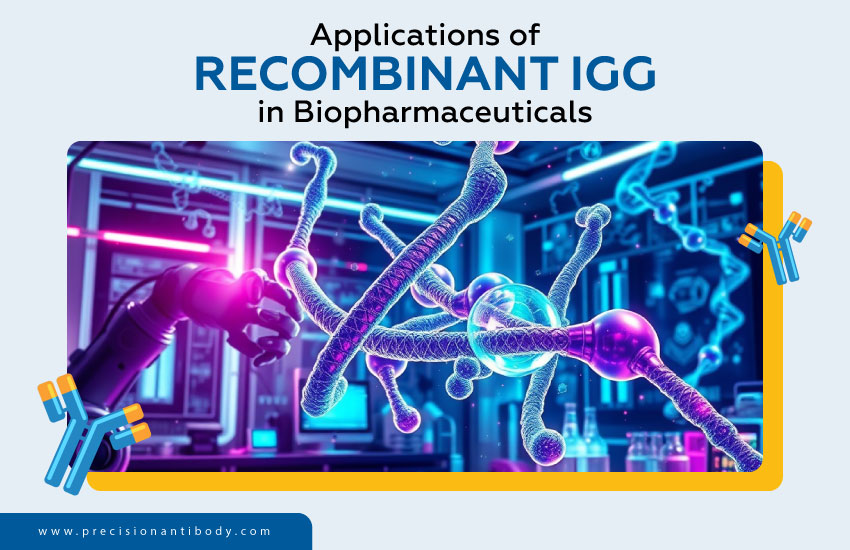
Recombinant immunoglobulin G (IgG) antibodies are very important for biopharmaceuticals, especially for monoclonal antibody therapies and cancer immunotherapy.
Targeting specific antigens, monoclonal antibodies (mAbs) provide therapeutic advantages for various illnesses.
Autoimmune diseases cause the immune system to assault body tissues. On occasion, high-dose IVIG made from pooled IgG antibodies modifies immune responses. Research shows that IVIG’s Fc fragments lessen inflammation. The recombinant human IgG1 Fc multimer GL-2045 uses these features. Unlike IVIG, GL-2045 firmly bound Fc receptors and hindered antibody-mediated phagocytosis in vitro.
It stopped antibodies from killing platelets in mice with immunological thrombocytopenic purpura and eased the pain that collagen causes in people with arthritis. A recent study found that glycosylation patterns, notably Fc sialylation, affect IgG’s anti-inflammatory properties. To treat autoimmune diseases, Recombinant IgG with improved sialylation was produced.
Recombinant IgG antibodies have greatly aided the development of therapies for numerous infectious diseases. For example, palivizumab, a humanized monoclonal antibody, was approved in 1998 to treat bronchiolitis caused by the Respiratory Syncytial Virus (RSV).
Researchers have also created recombinant antibodies that can be used to treat specific diseases, such as anthrax caused by Bacillus anthracis and Clostridium difficile.
Recombinant IgG monoclonal antibodies have been used in diagnostics to identify particular pathogens. For example, the recombinant IgG monoclonal antibody TsG10 can find neurocysticercosis by focusing on Taenia solium antigens in the blood.
Recombinant IgG antibodies have played a key role in developing cancer immunotherapy treatments, which use the body’s immune system to fight cancer. In addition to surgery, radiation, and chemotherapy, monoclonal antibody-based immunotherapy is now regarded as a key element of cancer treatment.
These antibodies go after tumor cells directly and help the immune system mount long-lasting attacks on tumors, among other clinically important ways they work. Because antibodies are so versatile as a therapeutic platform, new ways of treating cancer have been created that have a big effect on cancer care.
Antibodies like nivolumab and pembrolizumab, which target the immune checkpoint PD-1, are being tested to see if they can help treat T-cell lymphomas that have not responded to other treatments or have returned. In some subtypes, these treatments have shown encouraging results. Reactivating the immune response against tumor cells is the justification for these agents.
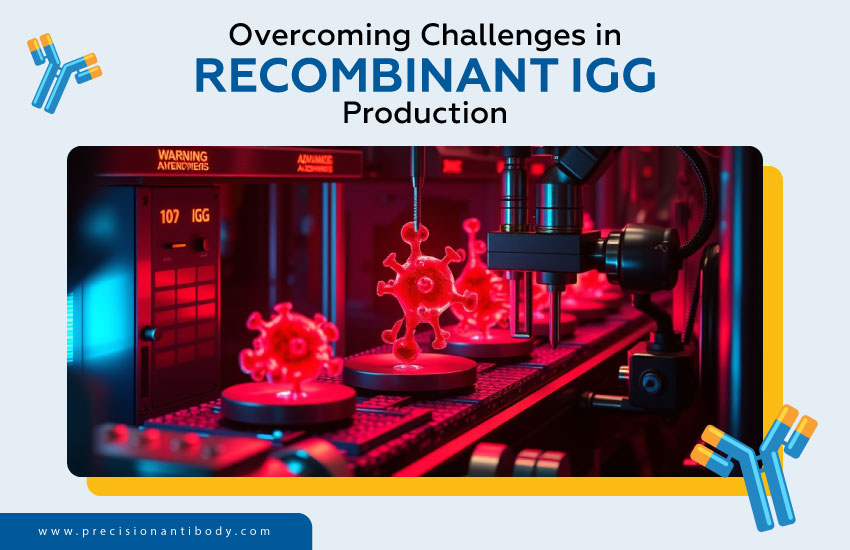
It can be difficult to make recombinant Immunoglobulin G (IgG) antibodies because you have to ensure that the expression systems work well so that you can make a lot of them, that the proteins fold correctly, and undergo the right post-translational changes.
Efficient production of recombinant IgG requires careful selection and optimization of expression systems to achieve high yields.
Various expression systems are employed for recombinant IgG production, each with distinct advantages and limitations:
To enhance IgG production several strategies are implemented:
Recombinant IgG antibodies must be folded correctly and have post-translational modifications made for them to work.
Misfolding can result in aggregates or non-functional antibodies, triggering immunological reactions. To lessen this:
IgG antibodies require specific post-translational modifications, particularly glycosylation, for stability and activity.
These strategies can help solve problems in the production of recombinant IgG, leading to higher yields of functional antibodies that can be used in medicine.

Recent advances in antibody engineering are improving the effectiveness and specificity of therapeutic antibodies.
Predictive modeling uses artificial intelligence algorithms to analyze large datasets to forecast antibody-antigen interactions. This helps direct the development of antibodies with improved binding affinity and specificity.
Leading the way in the manufacturing of recombinant IgG, Precision Antibody provides many services that expedite the development process:
With unmatched ability and speed, Precision Antibody expedites your study. Their capabilities range from extensive synthesis of recombinant IgG to advanced antibody humanization. Discover how their innovative solutions can transform your next breakthrough explore more at Precision Antibody!
Recombinant immunoglobulin G (IgG) antibodies are transforming the biopharmaceutical industry. They offer several benefits that make them essential for researchers and businesses seeking accuracy and efficiency.
Conventional antibody production techniques frequently produce uneven results due to batch-to-batch variability. On the other hand recombinant antibodies are made with specific genetic sequences guaranteeing unmatched uniformity throughout manufacturing. A key component of reliable scientific research is the reproducibility of experimental results which is improved by this reliability.
Recombinant antibody technology solves ethical issues and supports the global shift towards sustainable and compassionate research methods by eliminating the requirement for animal immunization.
Regular antibodies made from hybridomas have difficulty binding to certain antigens, but recombinant antibodies can be precisely engineered to do so. This accuracy increases the efficacy of therapeutic therapies by reducing the likelihood of non-specific binding.
Additionally, genetic modification can be used to make antibodies with better properties such as higher binding affinity or altered effector functions.
Compared to conventional techniques the recombinant production process is more flexible and requires less manpower, allowing quick scaling to satisfy industrial demands. Because of its efficiency, the development process can move more quickly from research to clinical application.
Using recombinant IgG antibodies enables researchers and biopharmaceutical businesses to meet increased criteria for accuracy, productivity and moral responsibility. Adopting this technology is a leap towards a future in biomedical research and therapies that is more dependable and compassionate not merely a step forward.

The switch to recombinant IgG represents a fundamental change in biopharmaceutical research and development, not merely a trend. Recombinant antibodies’ unparalleled specificity, scalability and consistency established a new medicinal and laboratory research benchmark. Their precise engineering lowers variation, raises binding affinity, and ensures reproducibility, all of which are important for making diagnostics and drug development better.
Additionally, by eliminating the need for animal immunization their manufacture enhances overall safety and aligns with ethical and regulatory norms. Recombinant IgG’s decreased immunogenicity and improved customization capabilities are paving the way for next-generation biopharmaceutical treatments.
As researchers and businesses care more about efficiency and dependability, recombinant IgG will be used more and more. This will solidify its place as the treatment and research tool of the future for antibody-based therapies. What impact do you think recombinant IgG will have on biotechnology in the future? Tell us in the comments section below. Remember to follow, like, and share for more innovative insights!
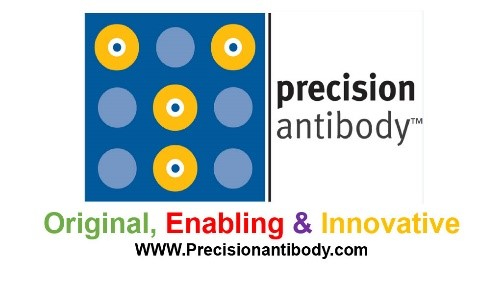
Led by innovative minds in immunology and the antibody development field, Precision Antibody has been an industry leader for over 20 years. We not only implement a cutting-edge technique in antigen design, antibody development, production, and other analyses, but we are also constantly working on ways to improve and advance technology to match the ever-changing world of science. If you are interested in learning more about Precision Antibody’s Custom Antibody development.
Precision Antibody™ is the forefront of the global Custom Antibody industry & it is led by the innovative minds in immunology and antibody development field.